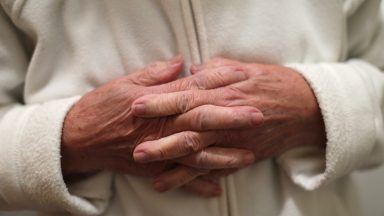Temperatures are set to remain in the teens in some areas overnight as Scots struggle to sleep in the heat.
Areas across the country have recorded new June records amid the scorching sun with the warmth lasting through the night.
Islay had its warmest June night on record on Tuesday, with a minimum of 16.7C at Port Ellen, beating the previous record of 15.7C recorded in 2007.
STV meteorologist Sean Batty said overnight temperatures will remain high, with close to record June levels across Argyll and Bute, the west Highlands, Inverclyde and Ayrshire.
What are the dangers of hot weather?
The public have been warned to watch out for sunburn or heat exhaustion, with changes in working practices and daily routines recommended.
There is a possible risk of power cuts due to failures in heat-sensitive systems and equipment.
With more people likely to visit coastal areas, lakes and rivers, there could be an increased risk of incidents near water.
Those planning on travelling to the red warning areas down south should expect “significant disruption”.
The Scottish Environmental Protection Agency (SEPA) has raised serious concerns over water scarcity in recent weeks.
Scottish Water has cautioned the country’s reservoirs are under strain as households continue to drain supplies during the summer months.
What about travel?
Speed restrictions are being put in place on key rail routes in Scotland to minimise potential damage due to extreme heat.
Rails in direct sunlight can be as much as 20C hotter than air temperatures and expand as they heat up, causing them to curve or buckle.
Train speeds in some areas are being limited – including on parts of the West Coast Mainline that links Glasgow Central with Carlisle via Lockerbie.

Can I leave work if it’s too hot?
Employers are legally obliged to ensure the temperature is reasonable as per the Workplace (Health, Safety and Welfare) Regulations 1992, though a maximum temperature has never been set.
If several employees complain, the employer is legally required to carry out a risk assessment. If it is not carried out, staff can refer to an industry regulator.
Otherwise, the Health and Safety Executive (HSE) recommend workers take regular breaks and drink plenty of water.
Sleeping in hot weather
Keeping your home cool is important for maintaining a comfortable temperature to sleep at night.
The NHS advises people to close curtains on rooms that face the sun to keep indoor spaces cooler.
Drink plenty of fluids throughout the day and avoid excess alcohol.
You can even try refrigerating your pillow for a little while before bedtime.

Taking care in the sun
To avoid sunburn, try to keep out of the sun between 11am to 3pm.
Walk in the shade, apply sunscreen regularly and wear a wide brimmed hat. If you have to go out in the heat, avoid exercising during the hottest parts of the day.
Look out for elderly or vulnerable people in the community who may be struggling in the heat.
Can we expect it to last?
If you’re finding this weather a bit too much then there will be little relief this week, Sean has said, but temperatures should come down next week along with more showery weather.
Longer term temperatures take a slow downward trend towards the end of June and into July as the weather starts to become more changeable.
Follow STV News on WhatsApp
Scan the QR code on your mobile device for all the latest news from around the country





























